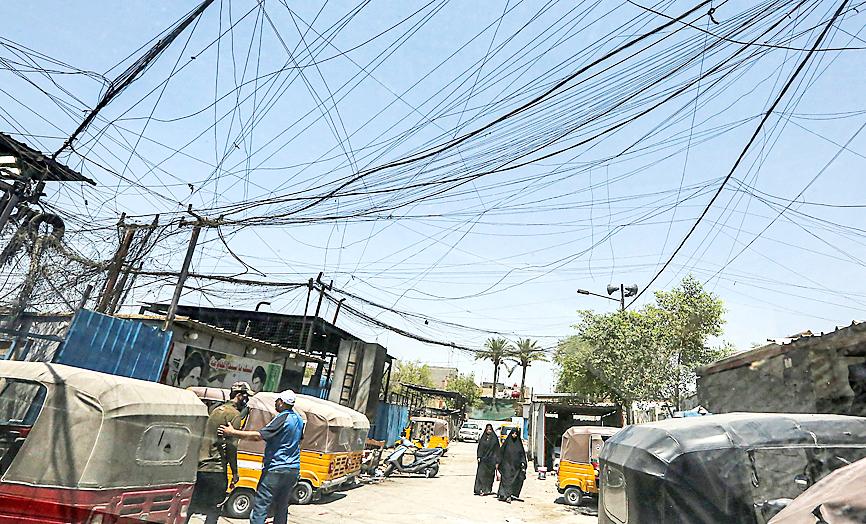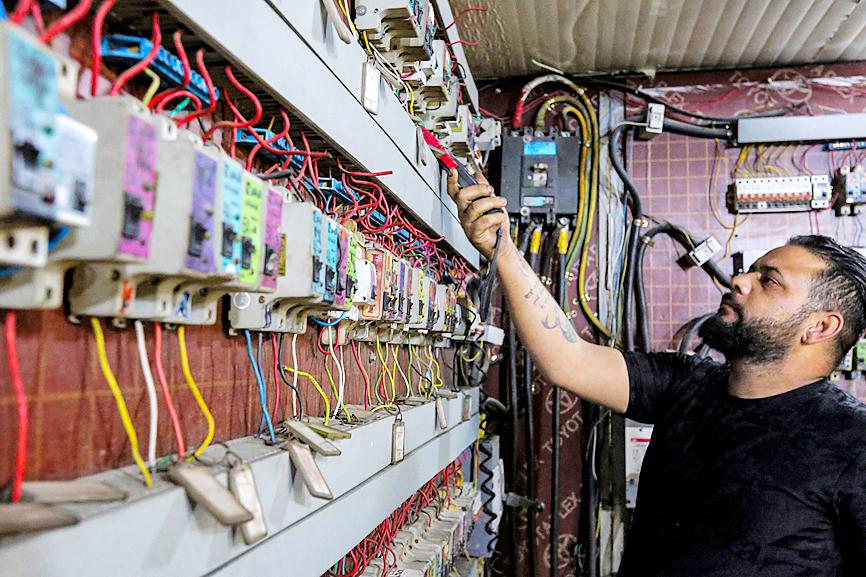Sweat drips from Aqeel Hassan as he tinkers with a labyrinth of wires that connect 270 homes in Baghdad’s sprawling Sadr City. It is a thankless job, but a crucial one amid another scorching heat wave.
His workplace is a humble shack right in front of his home, which comprises a bed, pigeons in a pen to keep him company, and more than 200 color-coded switches, which run to a loud, humming diesel generator.
Hassan is the neighborhood’s generator handyman, whose job involves installing and repairing the wires and switches to make sure his generator keeps running smoothly.

Photo: AFP
The system supplies power to homes on the block when the national grid breaks down.
As summer temperatures sizzle above 50°C, residents are increasingly reliant on his supply.
“I don’t have a start time, a time to clock in. I’m always on, around the clock,” said the 42-year-old, whose arms are covered in tattoos of Shiite sayings and saints.

Photo: AFP
Hassan said that he just fell into the job of maintaining generators after the US invasion in 2003.
Iraq — the second-largest producer in OPEC — buys gas and power from Iran to supply about one-third of its energy sector, which has become dilapidated by decades of conflict, poor maintenance and rampant corruption.
However, last month, Iran decided to cut the power supply to its western neighbor, saying that the Iraqi Ministry of Electricity owed it more than US$6 billion.
That left national electricity provider Wataniya unable to keep up with soaring demand from the country’s 40 million people.
“Our generators are working overtime these days — about 22 hours a day,” Hassan said.
Customers pay him to switch on his generator when the national grid fails.
Although sometimes, he provides electricity for free to the poorest people, he said.
“When electricity comes from the national grid, an alarm sounds and I go switch off the generator, so it can rest,” Hassan added.
His five-year-old son, Muslim, loves when it is time to power down, and rushes to help his father, who lifts him up to reach the switches.
Sadr City is the capital’s most densely populated suburb with more than 1 million low-income households packed next to each other.
Named after the late Shiite scholar Ayatollah Mohammad Sadq al-Sadr, it is clear how revered he is, with posters, banners and framed pictures of his powerful son, Moqtada al-Sadr, adorning every home.
There are 4.5 million privately owned generators nationwide, estimates Harry Istepanian, an independent energy consultant and senior fellow of the Iraq Energy Institute.
Each household spends “on average about US$100 to US$200 per month on electricity, [which] is equivalent to a US$6 billion to US$10 billion business for privately owned generators, but it neither contributes to the country’s economy nor pays taxes,” he said.
“There is no law that regulates the industry, as it is highly connected to the political elites and armed militias. It is part of Iraq’s complicated network of illicit businesses and black economy,” Istepanian added.

ELECTION DISTRACTION? When attention shifted away from the fight against the militants to politics, losses and setbacks in the battlefield increased, an analyst said Recent clashes in Somalia’s semi-autonomous Jubaland region are alarming experts, exposing cracks in the country’s federal system and creating an opening for militant group al-Shabaab to gain ground. Following years of conflict, Somalia is a loose federation of five semi-autonomous member states — Puntland, Jubaland, Galmudug, Hirshabelle and South West — that maintain often fractious relations with the central government in the capital, Mogadishu. However, ahead of elections next year, Somalia has sought to assert control over its member states, which security analysts said has created gaps for al-Shabaab infiltration. Last week, two Somalian soldiers were killed in clashes between pro-government forces and

Ten cheetah cubs held in captivity since birth and destined for international wildlife trade markets have been rescued in Somaliland, a breakaway region of Somalia. They were all in stable condition despite all of them having been undernourished and limping due to being tied in captivity for months, said Laurie Marker, founder of the Cheetah Conservation Fund, which is caring for the cubs. One eight-month-old cub was unable to walk after been tied up for six months, while a five-month-old was “very malnourished [a bag of bones], with sores all over her body and full of botfly maggots which are under the

BRUSHED OFF: An ambassador to Australia previously said that Beijing does not see a reason to apologize for its naval exercises and military maneuvers in international areas China set off alarm bells in New Zealand when it dispatched powerful warships on unprecedented missions in the South Pacific without explanation, military documents showed. Beijing has spent years expanding its reach in the southern Pacific Ocean, courting island nations with new hospitals, freshly paved roads and generous offers of climate aid. However, these diplomatic efforts have increasingly been accompanied by more overt displays of military power. Three Chinese warships sailed the Tasman Sea between Australia and New Zealand in February, the first time such a task group had been sighted in those waters. “We have never seen vessels with this capability

‘NO INTEGRITY’: The chief judge expressed concern over how the sentence would be perceived given that military detention is believed to be easier than civilian prison A military court yesterday sentenced a New Zealand soldier to two years’ detention for attempting to spy for a foreign power. The soldier, whose name has been suppressed, admitted to attempted espionage, accessing a computer system for a dishonest purpose and knowingly possessing an objectionable publication. He was ordered into military detention at Burnham Military Camp near Christchurch and would be dismissed from the New Zealand Defence Force at the end of his sentence. His admission and its acceptance by the court marked the first spying conviction in New Zealand’s history. The soldier would be paid at half his previous rate until his dismissal